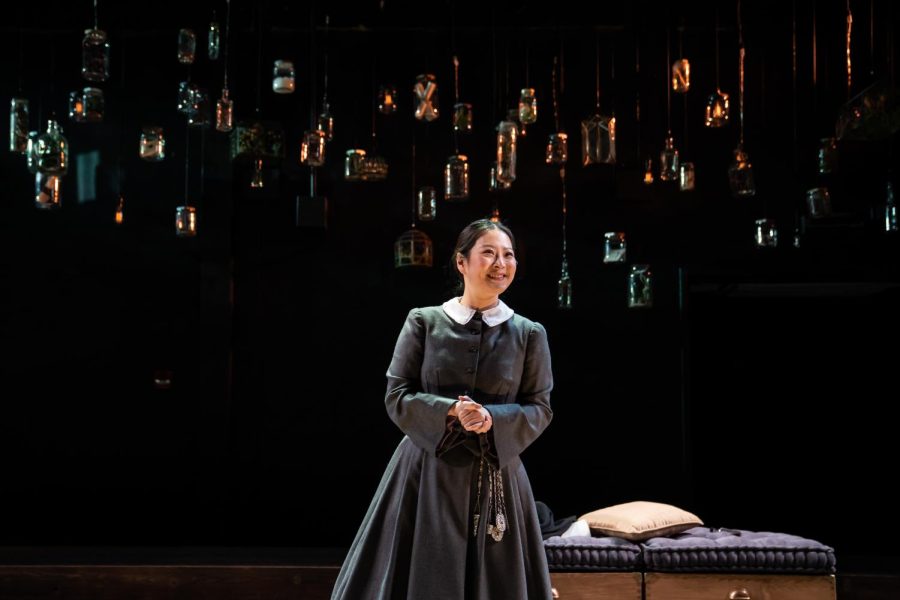Lookingglass Theatre promises more than a gothic tale with ‘Villette’ premiere
Mi Kang as Lucy Snowe. Lookingglass Theatre’s premiere of “Villette” promises more than a classic gothic tale, with love, loss and plenty of modern gumption.
February 22, 2023
This piece contains mild spoilers.
From the get-go, the Lookingglass Theatre Company’s production of “Villette” informs audiences of exactly the type of story they will not see. The story is told from the perspective of the reserved Lucy Snowe, a young woman hardened by misgivings of the past. Lookingglass artistic associate Sara Gmitter’s adaptation of Charlotte Brontë’s gothic novel promises more than a love story. It’s a recounting of heartbreak, relationships and a commanding woman coming into her own.
Through routinely breaking the fourth wall, Lucy — played by Lookingglass newcomer Mi Kang — unfolds the tale of her time in the fictional village Villette as she navigates teaching at an elite boarding school, unrequited love and learning French. Lessons in the play consist not only of classroom lectures but also morals imparted to Lucy via her interactions with a handful of familiar tropes.
Left to recover from an unknown family disaster, Lucy finds herself alone in a world defined by social connections, conduct and appearance. Her murky past lingering, Lucy balances interactions with a curt headmistress, a love-struck doctor, a precocious teenager and even a possible ghost, all while working toward one day owning a school with her name on it.
Mere minutes into their introduction, Lucy’s first friend Ginevra Fanshawe (Mo Shipley) quickly relays the importance of “acquaintances” in achieving a reputable social standing. Both from vastly different backgrounds — one a wealthy elite off to school, the other jobless and following the wind — Ginevra’s mentioning of an open position at her school sets the plot in motion.
Despite their ample differences, Ginevra remains a steadfast player in Lucy’s life, frequently voicing her need for attention and assurance of her good looks at any given chance. Whether dishing out the latest gossip or preparing for a party, Lucy acts as a voice of frustrated reason against Ginevra’s more destructive ways — a dynamic Shipley delighted in developing.
“It’s a little heartbreaking when you love someone and they are real with you,” they said. “It’s fun to watch flawed people, but they both bring out the best in each other and they truly love each other.”
Much of the first act focuses on Lucy’s adoration for the provincial Dr. John Graham Bretton, the son of Lucy’s godmother and hopeless victim of Ginevra’s ruthless games. Eclipsed by Ginevra’s traditional beauty, Lucy resigns herself to writing elaborate letters confessing her love and counseling the kind-hearted professional on his own romantic conquestions. Only when she is willing to let go of a love not meant for her is another able to step out from the wings.
The cast’s comedic timing is a welcome treat, as it weaves wry remarks and compelling facial expressions between more profound moments. Helen Joo Lee’s uptight portrayal of headmistress Madame Beck foils the loud-mouthed Ginevra, who steals laughs for her unapologetic frankness and for voicing selfish thoughts often kept to ourselves.
Debo Balogun’s performance as the quick-witted theatre professor Paul Emanuel is pure delight. After insisting Lucy partake in the school’s annual play, the two strike up a rapport that drives the secluded school teacher from her loner ways. Some of the show’s best moments came from Balogun’s ability to change his composure on a dime. Given the chemistry between the two characters, I wish their story was given more stage time, instead of waiting until the second act for their connection to blossom.
Similarly, it takes until the last minutes of the show for Lucy to reach her emotional peak. Finally willing to express her heart and chase her dreams no matter the consequences, she finds herself in a storm of love, loss and hope for the future. Though a dutiful narrator, at times Lucy’s constant insight takes away from the development of her character and the action itself. Had I craved hearing a story over watching one unfold, I would have reverted to the original novel.
Patron and Theatre for Young Audiences professional Ashley Laverty remarked that while elements of design and acting prowess strengthened the performance, she felt the narration took away from overall engagement with the text.
“The lead actor was effervescent and amazing, and it was because of her that I was in it,” Laverty said. “But, a lot of it I felt I was being told what happened, rather than being shown what happened.”
However, the most striking moment was when large panels adorned with Lucy’s letters to a particular love interest slid open to reveal an array of hanging glass lanterns as stand-in for the night sky. Largely simple in terms of general stage design, Laverty said the array of blue bulbs of every shape and size was anything but. The dramatic reveal created a true spark of magic encapsulated in the world of Villette.
After falling in love with Sara Gmitter’s early versions of the script, director Tracy Walsh hopes audiences connect to the production’s complex protagonist made for any era. A meld of traditional Brontë and modern gumption, there is something for every viewer to learn from Lucy’s journey.
“It is not a story that is only precious to women,” Walsh said. “You get invested in the characters because they’re all likable in their own way. It’s both 19th century and completely accessible to any human.”
Email: [email protected]
Twitter: @NixieStrazza
Related Stories:
— ‘Burn with desire’: ‘Blood Wedding’ ignites forgiveness and forbidden love at the Wirtz Center


